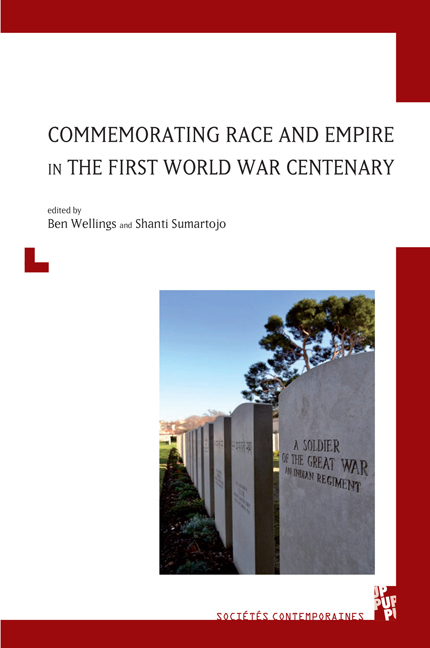Book contents
- Frontmatter
- Contents
- Commemorating Race and Empire in the First World War Centenary
- Rediscovering and Rehabilitating Empire, 2014-2018
- From ‘Coolie’ to Transnational Agent: the ‘Afterlives’ of World War One Chinese Workers
- Marigolds and Poppies: Commemorating ‘Indian’ War Dead
- Situating the Belgian Congo in Belgium's First World War Centenary
- Maori and Great War Commemoration in New Zealand: Biculturalism and the Politics of Forging National Memory
- Representing Race and Empire, 1900-1920
- Memorialising Race and Empire in Settler Societies, 1919-2018
- Contibutor Biographies
- Index terms
Situating the Belgian Congo in Belgium's First World War Centenary
from Rediscovering and Rehabilitating Empire, 2014-2018
- Frontmatter
- Contents
- Commemorating Race and Empire in the First World War Centenary
- Rediscovering and Rehabilitating Empire, 2014-2018
- From ‘Coolie’ to Transnational Agent: the ‘Afterlives’ of World War One Chinese Workers
- Marigolds and Poppies: Commemorating ‘Indian’ War Dead
- Situating the Belgian Congo in Belgium's First World War Centenary
- Maori and Great War Commemoration in New Zealand: Biculturalism and the Politics of Forging National Memory
- Representing Race and Empire, 1900-1920
- Memorialising Race and Empire in Settler Societies, 1919-2018
- Contibutor Biographies
- Index terms
Summary
As in other countries, the surge of interest in Great War commemoration in Belgium has taken many by surprise. Public engagement in 2014 was undeniable: exhibitions were visited, special newspaper editions were bought, documenta–ries were watched and elaborate commemorations attended. Public demand for knowledge of the First World War was driven by a desire to situate family and local history within wider themes of the War. In the course of such commemora–tion, Belgians rediscovered the horror of the trenches, the massacres of civilians in 1914 and the harshness of the German occupation, whilst attempting to situate their own family histories in the grand narrative of the conflict. In contrast, it is clear that the participation of the Belgian Congo in the First World War received neither official nor media attention. Only modest private initiatives saw the light of day during the Centenary. But with a significant Congolese diaspora resident in Belgium, how can we explain the ‘forgetting’ of the Belgian Congo in the Centenary commemorations? What indeed was the Belgian Congo's actual contribution to the War? Who organised those rare initiatives of commemoration and for whose benefit? These are the questions that will frame this chapter, which examines the two major issues that pertained to the Belgian Congo in 1914-1918: the question of the colony's neutrality and then the major military operations in central Africa. In light of this, the chapter then examines and explains the lack of commemora–tive activity in Belgium concerning its former colony. This chapter concludes that the regional administrative division of commemorative organisation combined with the historical conditioning of Belgian colonial memory created this absence in Belgium's Centenary commemorations.
The Outbreak of the War and the Question of Belgian Congo Neutrality
This official and public forgetting belies the fact that the Belgian Congo was heavily involved in the First World War. When war broke out in Europe, the Belgian Congo was in a delicate situation. Rendered theoretically neutral by Article 10 of the Berlin Treaty signed in February 1885, this dispensation had technically carried over when the Belgian state assumed control of the colony in 1908.
- Type
- Chapter
- Information
- Publisher: Liverpool University PressPrint publication year: 2018

